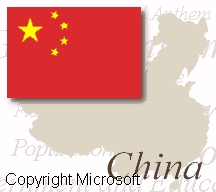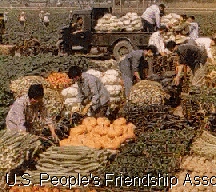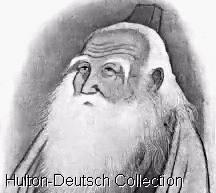
Current Project: I am now attending the summer school session in the Upward Bound program at the University of Washington. We attend class just like regular school. We have Math, Language Arts and Technology classes. In Language, we are preparing to compose a narrative essay and the teachers here are really nice. They are not as confusing and scary as the regular teachers at school. I like this program because I learn and master many skills, and I am doing something constructive over the summer.
Favorite WWW site so far:
My favorite WWW site is: http://www.hk.super.net/~madness/filmography/somebody/somebody.html
I like it because it is about films made in Hong Kong. Films and movies are also part of a culture.
Biography:
I was born in China Guangzhou (Canton). The picture shows the busy city. I came to the United States when I was six years old, then I quickly learned the different aspects of being an American. Though I live in America, I wanted to learn about my heritage and the Chinese culture. At school, I took Chinese as my foreign language. I learned to write, and speak Mandarin.

We value our heritage and culture very much. We perform certain rituals such as worshipping the Gods and Goddesses to thank them for the good year they have given to us. We burn paper money and prepare a feast for them. We did this during the Chinese New Year's Eve. I also enjoyed the food my mother cooked for us. There was a variety of beef, chicken, pork, and vegetables served at the dinner table. At dinner, my parents often told me some of the philosophies they were taught when they were young. These philosophies were a very important part of our culture. It showed us the
correct way to live our lives.
The following pictures and text gives more information and details about some parts of the Chinese culture. I have included the map of China and its flag. The text includes information on the philosophies the Chinese practices and the diet they eat. Most families eat together in China, and they would sometimes talk about political, economical, and philosophical topics over the dinner table. This is how political and social life come together.


Diet
Generally, there is not a wide variety of food available throughout the country, except where private enterprise is encouraged. What people eat depends largely on what is produced in the region where they live. Dishes with potatoes, tofu, cornmeal, rice, and other grains are staple meals. Noodles are also common and man tou (steamed bread) is a staple in northern China. Dishes made with pork, beef, chicken, or fish are popular but expensive. Specialties vary from region to region, from duck in Beijing to spicy dishes in Sichuan province. Fruits and vegetables are eaten in season; few dairy products are available or eaten. Sauces are mixed with vegetables and meats and eaten with rice.
Eating
Chopsticks are used for all meals in China. When finished, a person places the chopsticks neatly on the table; they are not left in the rice bowl. Food is placed at the center of the table and may include more than one type of main dish to be eaten with rice. Some food is taken to be placed in the bowl, which is then held close to the mouth for eating. Inedible bones and seeds are placed on the table or a dish but never back in the rice bowl. Soup is served toward the end of a meal.

Chinese Philosophy, collective designation for the various schools of thought originated by Chinese scholars and sages. Chinese philosophy has passed through three distinct historical stages: the classical age, a creative period from the 6th to the 2nd century BC; the medieval age, from the 2nd century BC to the 11th century AD, a period of synthesis and absorption of foreign thought; and the modern age, from the 11th century to the present, a period of maturation of earlier philosophical trends and introduction of new philosophies from the West. Throughout all these periods, Chinese thought has tended toward humanism rather than spiritualism, rationalism rather than mysticism, and syncretism rather than sectarianism. [1]
Confucius
Nearly 3000 years ago, when intrigue and vice were rampant in feudal China, the philosopher Confucius taught principles of proper conduct and social relationships that embraced high ethical and moral standards. Confucius's teachings and wisdom were standard scholarly education for the bureaucrats who administered the country. The Confucian tradition, which encompasses education, wisdom, and ethics, persists in China.

Hobbies:
My hobbies include reading, playing Tennis, Basket Ball, Soccer and Badminton. My interests are analyzing short stories and collecting pictures of Hong Kong movie stars.
[1]"Chinese Philosophy," Microsoft® Encarta® 96 Encyclopedia. © 1993-1995 Microsoft Corporation. All rights reserved. © Funk & Wagnalls Corporation. All rights reserved.